General, Sir John Monash, Personal Files Book 22, 1 February - 10 April 1919- Part 5
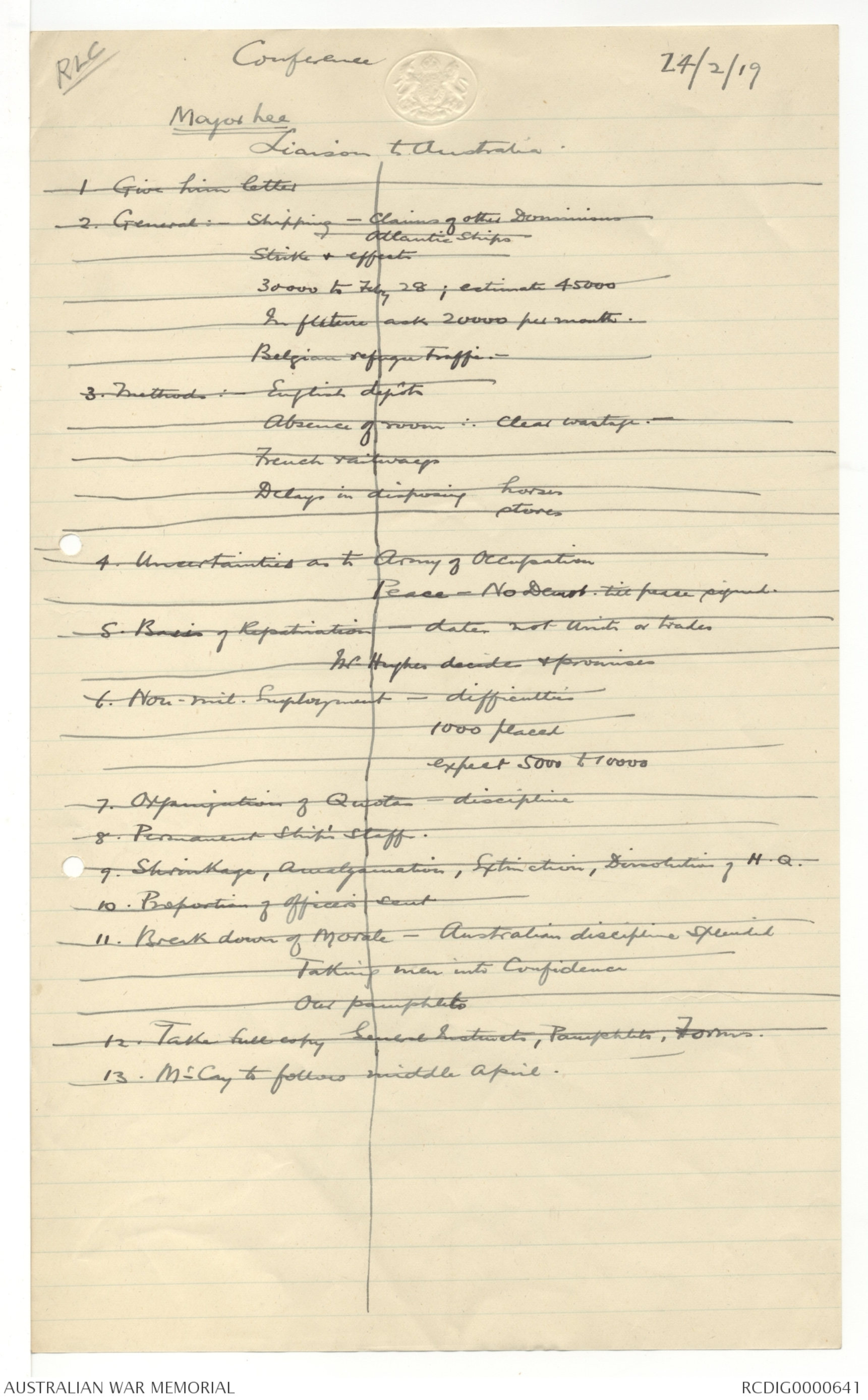
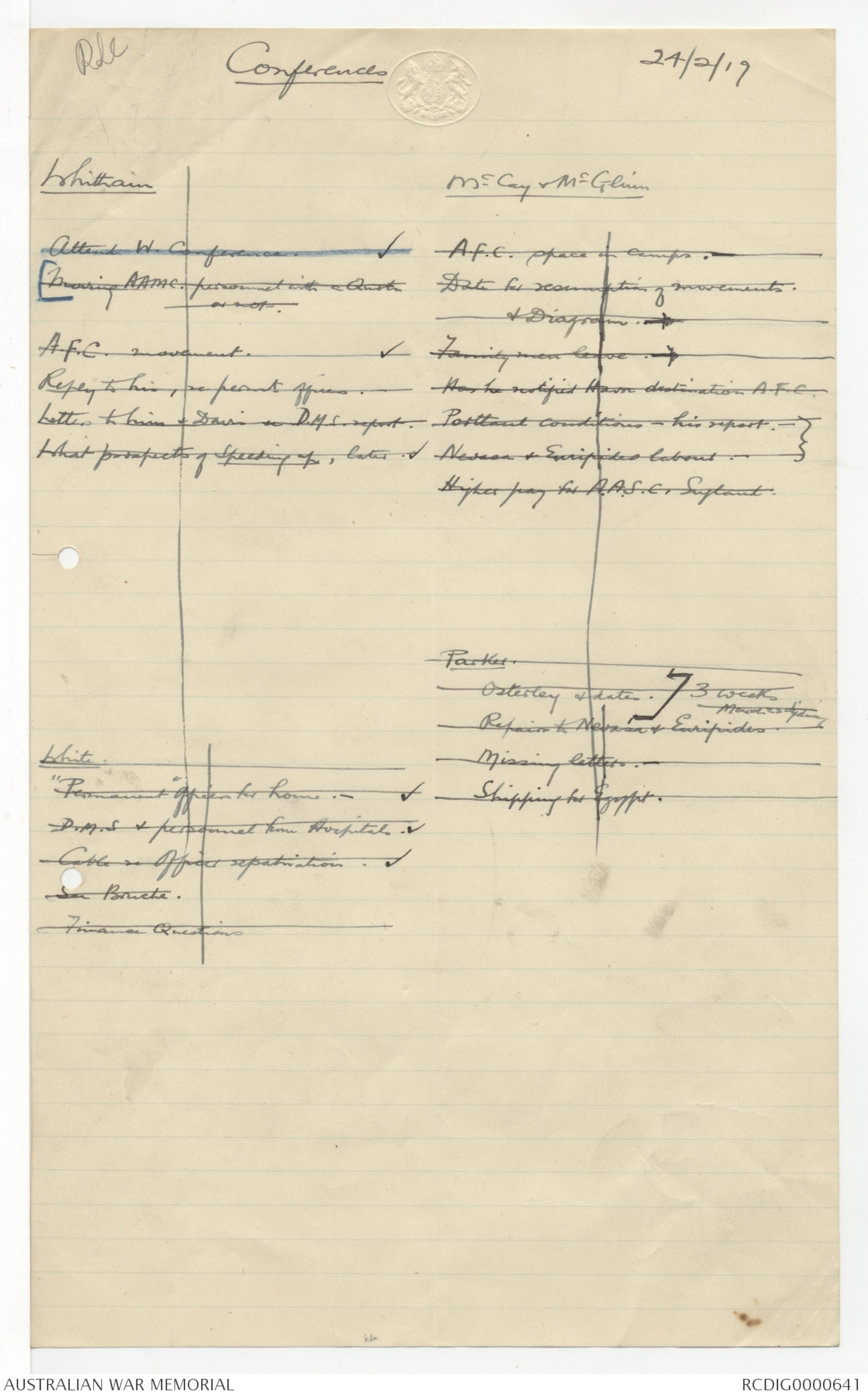
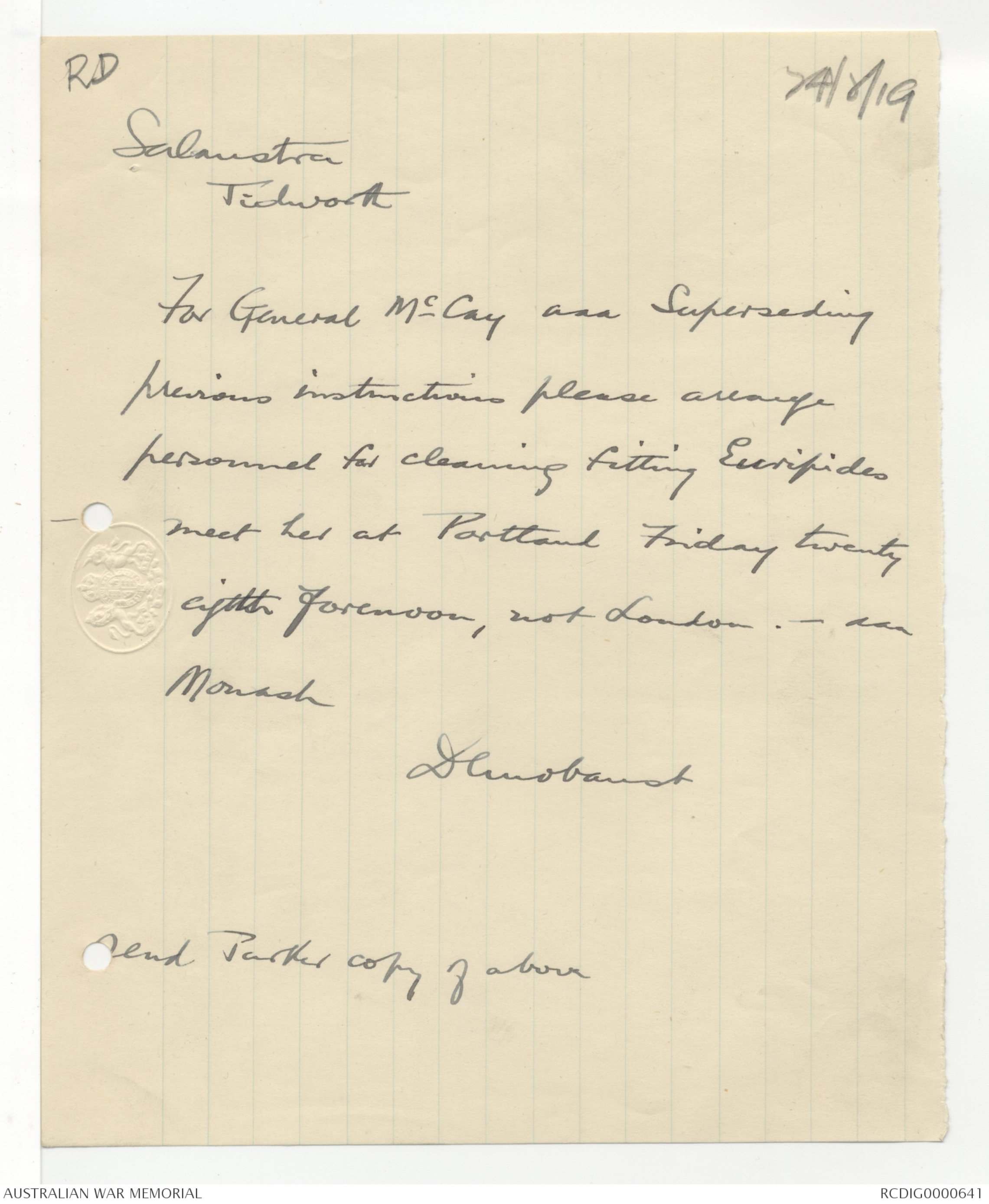
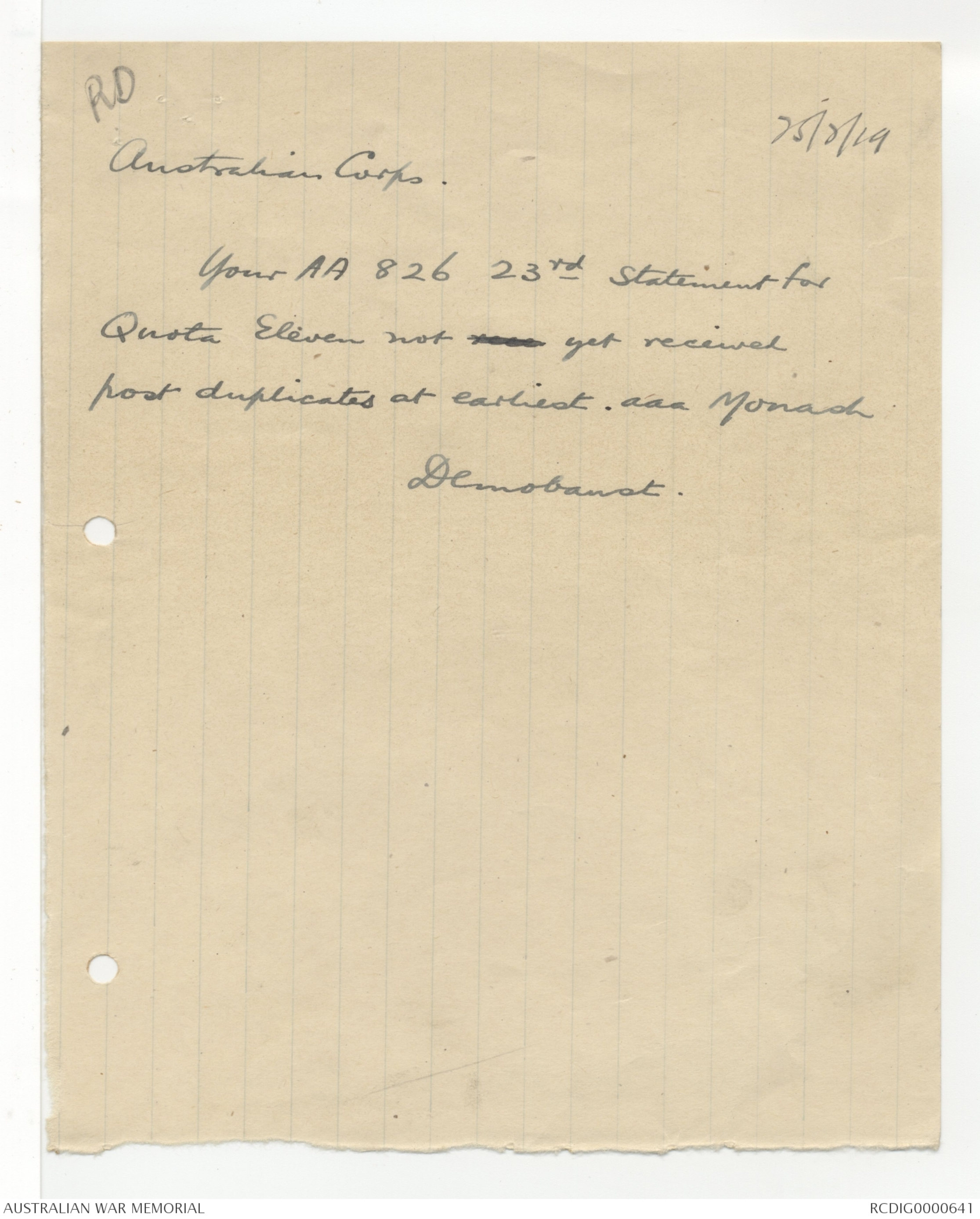
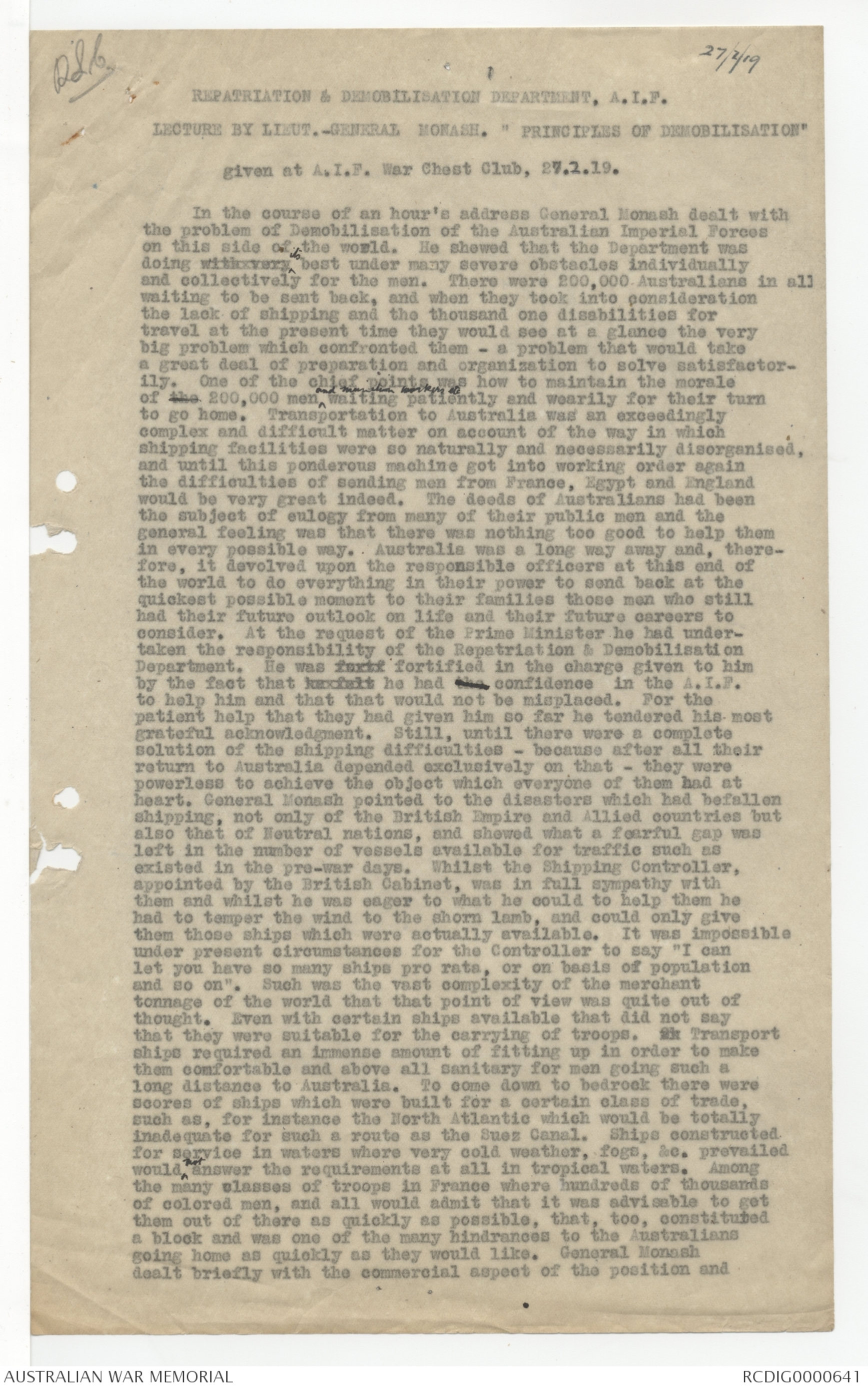
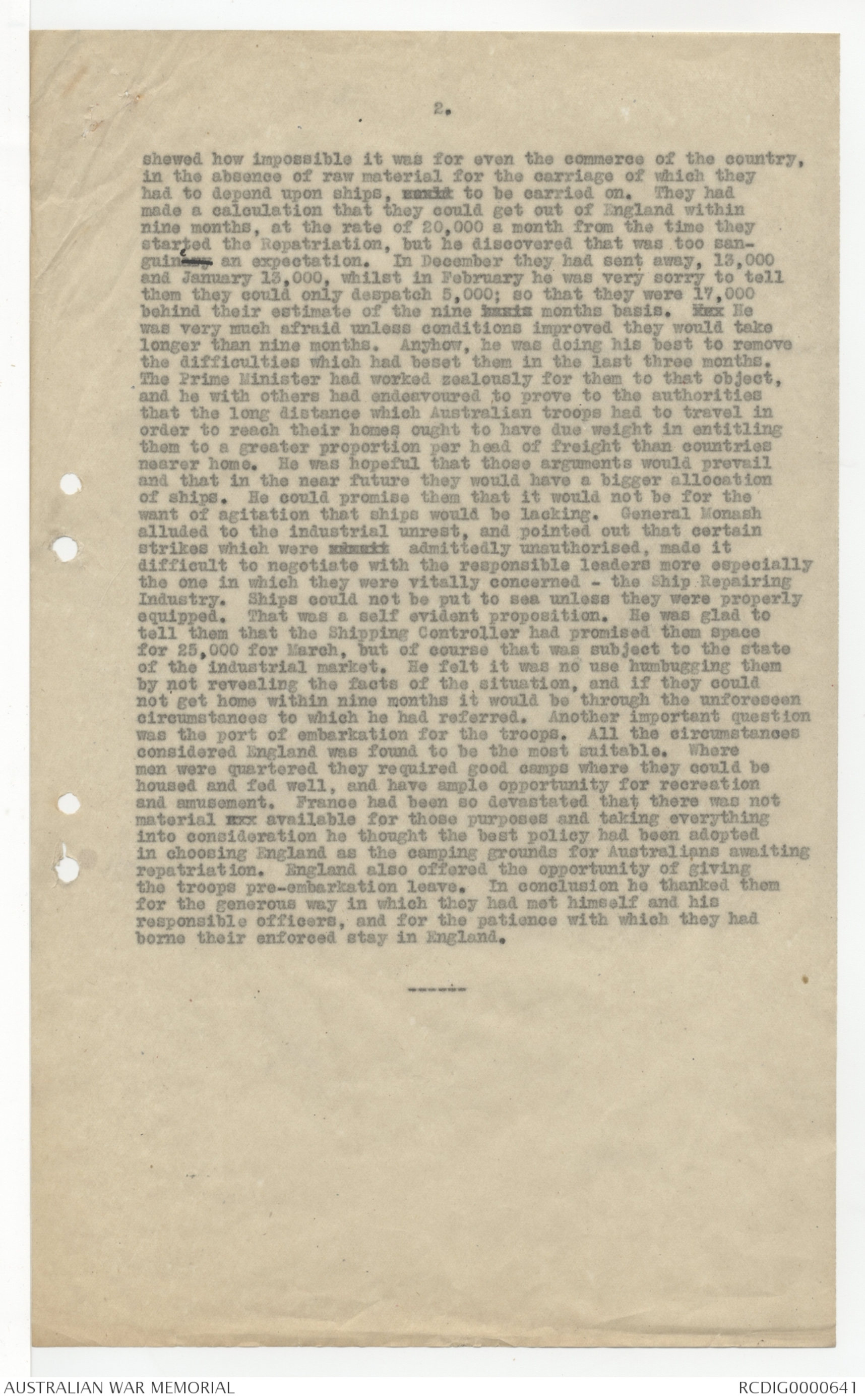
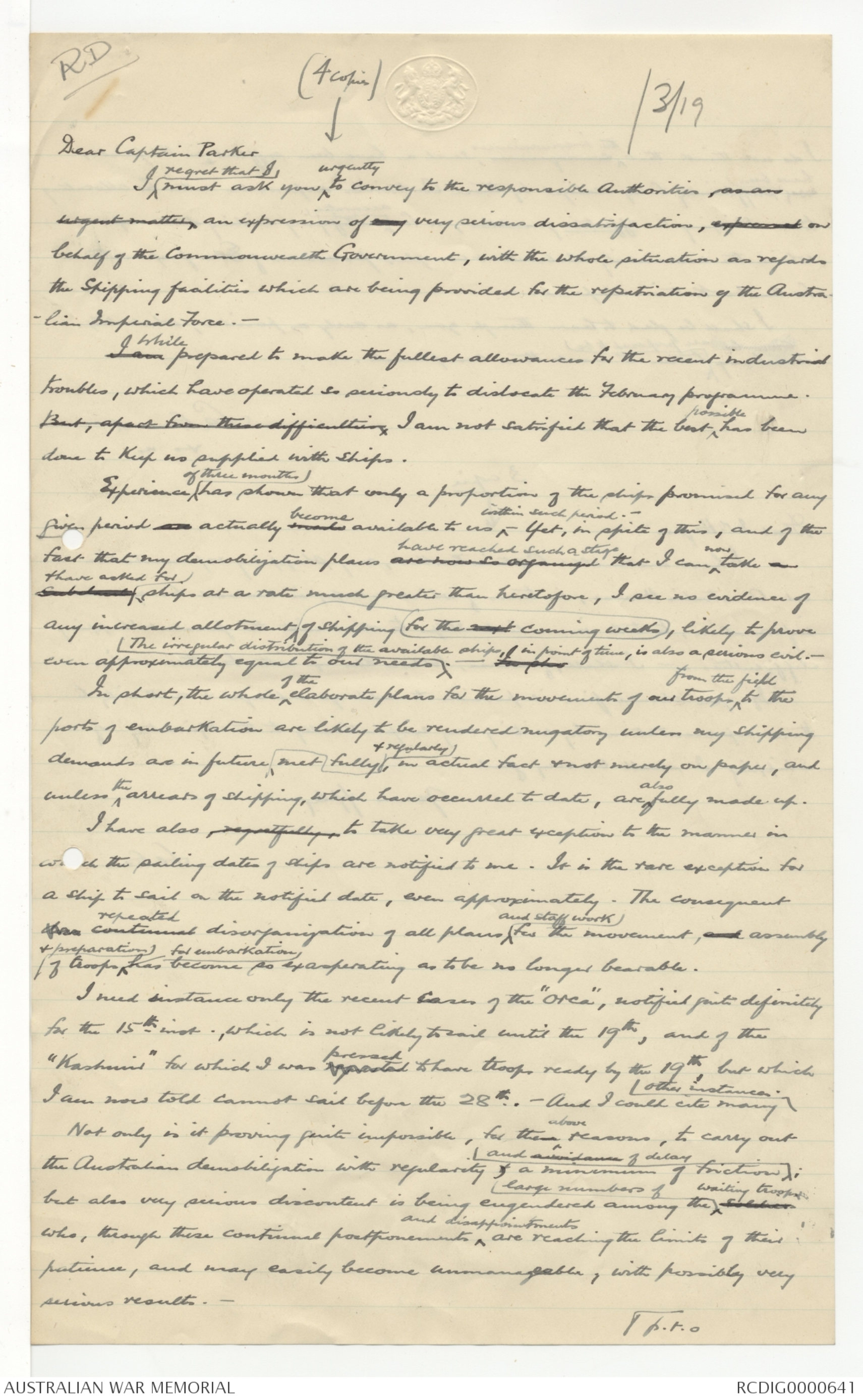
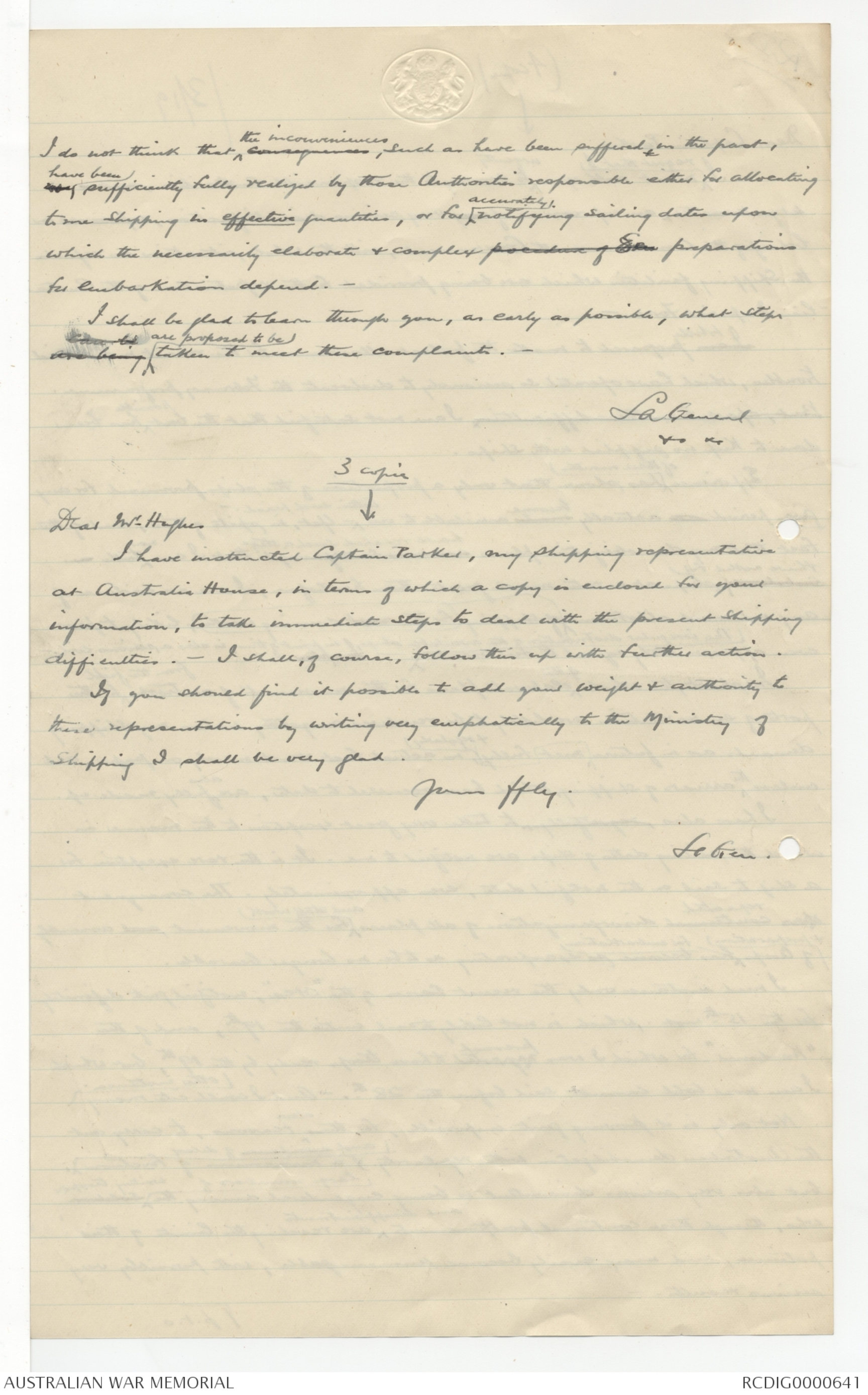
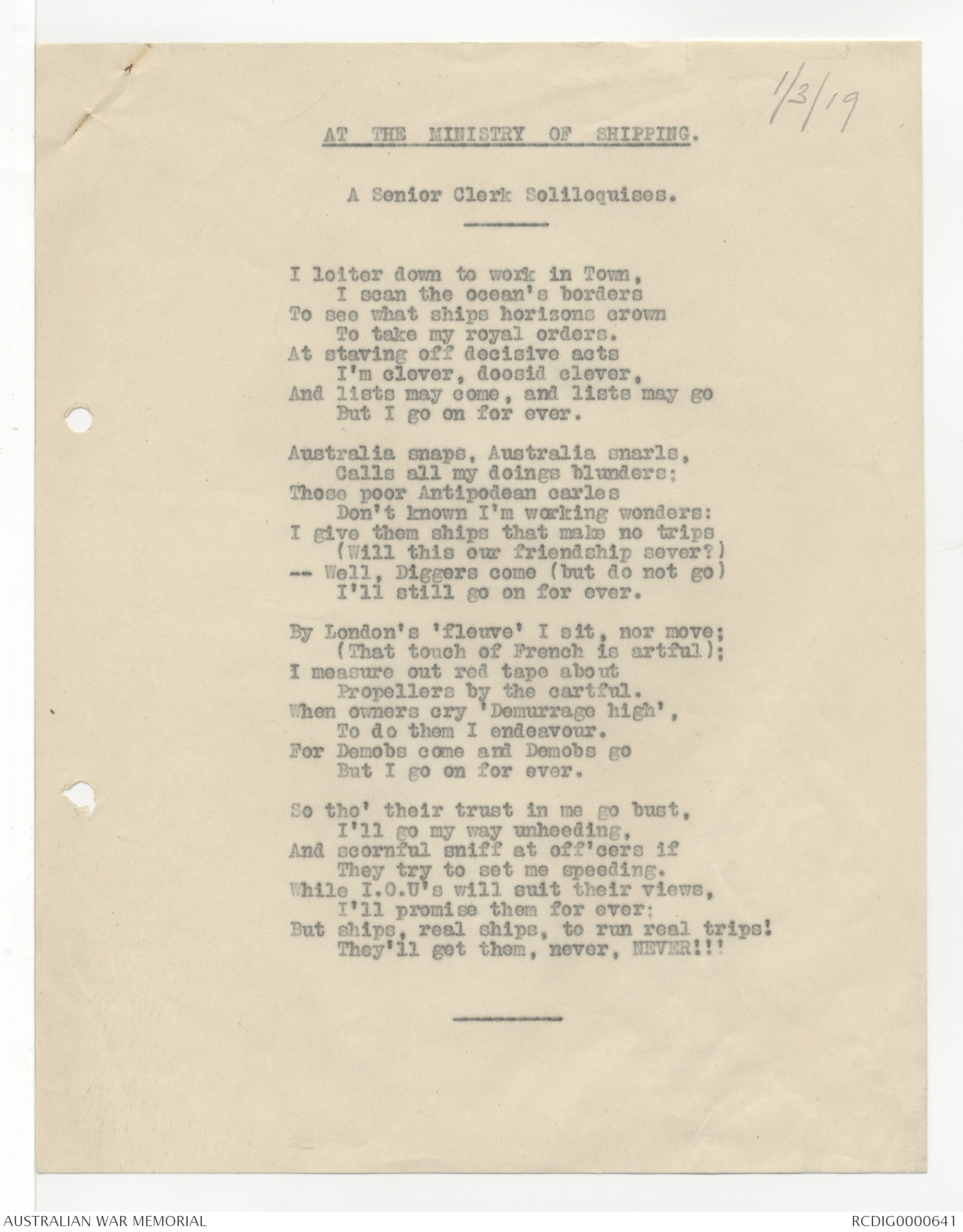
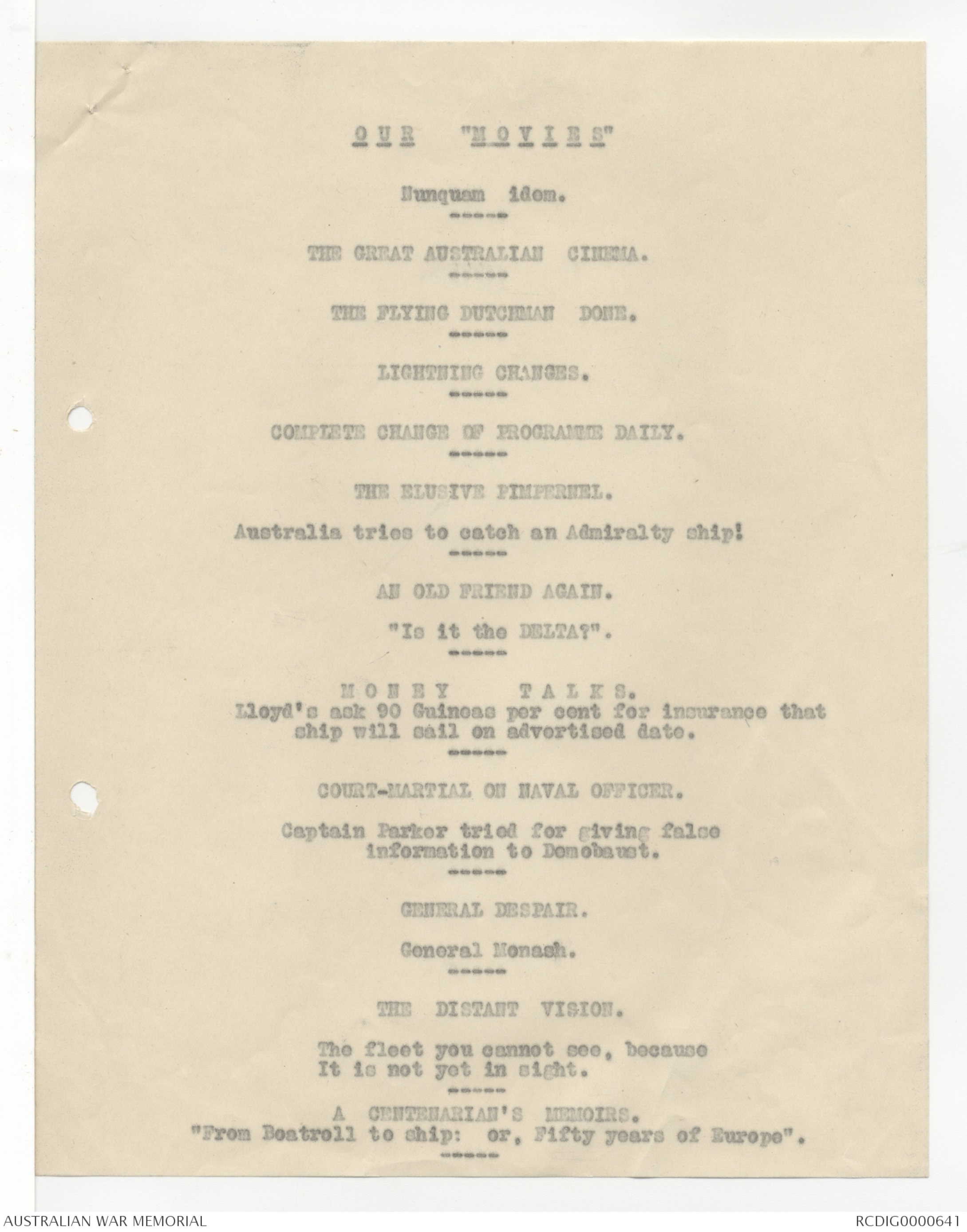
RLC
Conference
24/2/19
Major Lee
Liaison to Australia
1 Give him letter-
General :- Shipping - Claims of other DominionsAtlantic ShipsStrike & effects30000 to Feby 28; estimate 45000In future ask 20000 per month.Belgian refugee Traffic. - -
Methods :- English depotsAbsence of room : Clear wastage. -French railwaysDelays in disposing horsestores -
Uncertainties as to Army of OccupationPeace - No Demob. till peace signal. -
Basis of Repatriation - later not Units or tradesMr Hughes decides & promises -
Non-mil. Employment - difficulties1000 placedexpect 5000 to 10000 Organization of Quotas - disciplinePermanent Ship's Staff.Shrinkage, Amalgamation, Extinction, Dissolution of H.Q.Proportion of Officer's sent-
Break down of Morale - Australian discipline splendidTaking men into ConfidenceOur pamphlets Take full copy General Instructs, Pamphlets, Forms.McCay to follow middle April.
RLC
Conferences
24/2/19
| Whittain | McCay & McGlinn |
|
|
|
|
|
|
[*RD*]
24/8/19
Salaustra
Tidworth
For General McCay aaa Superseding
previous instructions please arrange
personnel for cleaning fitting Euripides
meet her at Portland Friday twenty
eighth forenoon, not London. - aaa
Monash
DCunobaust
send Parker copy of above
[*RD*]
25/8/19
Australian Corps.
Your AA 826 23rd Statement for
Quota Eleven not rec yet received
post duplicates at earliest. aaa Monash
Demobaust.
[*RLC*]
27/2/19
REPATRIATION & DEMOBILISATION DEPARTMENT, A.I.F.
LECTURE BY LIEUT.-GENERAL MONASH. "PRINCIPLES OF DEMOBILISATION"
given at A.I.F. War Chest Club, 27.2.19.
In the course of an hour's address General Monash dealt with
the problem of Demobilisation of the Australian Imperial Forces
on this side of the world. He showed that the Department was
doing with very its very best under many severe obstacles individually
and collectively for the men. There were 200,000 Australians in all
waiting to be sent back, and when they took into consideration
the lack of shipping and the thousand one disabilities for
travel at the present time they would see at a glance the very
big problem which confronted them - a problem that would take
a great deal of preparation and organisation to solve satisfactorily.
One of the chief points was how to maintain the morale
of the 200,000 men and maintain workers etc waiting patiently and wearily for their turn
to go home. Transportation to Australia was an exceedingly
complex and difficult matter on account of the way in which
shipping facilities were so naturally and necessarily disorganised,
and until this ponderous machine got into working order again
the difficulties of sending men from France, Egypt and England
would be very great indeed. The deeds of Australians had been
the subject of eulogy from many of their public men and the
general feeling was that there was nothing too good to help them
in every possible way. Australia was a long way away and, therefore,
it devolved upon the responsible officers at this end of
the world to do everything in their power to send back at the
quickest possible moment to their families those men who still
had their future outlook on life and their future careers to
consider. At the request of the Prime Minister he had undertaken
the responsibility of the Repatriation & Demobilisation
Department. he was fortf fortified in the charge given to him
by the fact that he felt he had the confidence in the A.I.F.
to help him and that that would not be misplaced. For the
patient help that they had given him so far he tendered his most
grateful acknowledgement. Still, until there was a complete
solution of the shipping difficulties - because after all their
return to Australia depended exclusively on that - they were
powerless to achieve the object which everyone of them had at
heart. General Monash pointed to the disasters which had befallen
shipping, not only of the British Empire and Allied countries but
also that of Neutral nations, and showed what a fearful gap was
left in the number of vessels available for traffic such as
existed in the pre-war days. Whilst the Shipping Controller,
appointed by the British Cabinet, was in full sympathy with
them and whilst he was eager to what he could to help them he
had to temper the wind to the shorn lamb, and could only give
them those ships which were actually available. It was impossible
under present circumstances for the Controller to say "I can
let you have so many ships pro rata, or on basis of population
and so on". Such was the vast complexity of the merchant
tonnage of the world that that point of view was quite out of
thought. Even with certain ships available that did not say
that they were suitable for the carrying of troops. Xx Transport
ships required an immense amount of fitting up in order to make
them comfortable and above all sanitary for men going such a
long distance to Australia. To come down to bedrock there were
scores of ships which were built for a certain class of trade,
such as, for instance the North Atlantic which would be totally
inadequate for such a route as the Suez Canal. Ships constructed
for service in waters where very cold weather, fogs, &c. prevailed
would not answer the requirements at all in tropical waters. Among
the many classes of troops in France where hundreds of thousands
of colored men, and all would admit that it was advisable to get
them out of there as quickly as possible, that, too, constituted
a block and was one of the many hindrances to the Australians
going home as quickly as they would like. General Monash
dealt briefly with the commercial aspect of the position and
2.
showed how impossible it was for even the commerce of the country,
in the absence of raw material for the carriage of which they
had to depend upon ships, could to be carried on. They had
made a calculation that they could get out of England within
nine months, at the rate of 20,000 a month from the time they
started the Repatriation, but he discovered that was too sanguinanye
an expectation. In December they had sent away 13,000
and January 13,000 whilst in February he was very sorry to tell
them they could only despatch 5,000; so that they were 17,000
behind their estimate of the nine basis months basis. Hex He
was very much afraid unless conditions improved they would take
longer than nine months. Anyhow, he was doing his best to remove
the difficulties which had beset them in the last three months.
The Prime Minister had worked zealously for them to that object,
and he with others had endeavoured to prove to the authorities
that the long distance which Australian troops had to travel in
order to reach their homes ought to have due weight in entitling
them to a greater proportion per head of freight than countries
nearer home. He was hopeful that those arguments would prevail
and that in the near future they would have a bigger allocation
of ships. He could promise them that it would not be for the
want of agitation that ships would be lacking. General Monash
alluded to the industrial unrest, and pointed out that certain
strikes which were xxxx admittedly unauthorised, amde it
difficult to negotiate with the responsible leaders more especially
the one in which they were vitally concerned - the Ship Repairing
Industry. Ships could not be put to sea unless they were properly
equipped. That was a self evident proposition. He was glad to
tell them that the Shipping Controller has promised them space
for 25,000 for March, but of course that was subject to the state
of the industrial market. He felt it was no use humbugging them
by not revealing the facts of the situation, and if they could
not get home within nine months it would be through the unforeseen
circumstances to which he had referred. Another important question
was the port of embarkation for the troops. All the circumstances
considered England was found to be the most suitable. Where
men were quartered they required good camps where they could be
housed and fed well, and have ample opportunity for recreation
and amusement. France had been so devastated that there was not
material xxx available for those purposes and taking everything
into consideration he thought the best policy had been adopted
in choosing England as the camping grounds for Australians awaiting
repatriation. England also offered the opportunity of giving
the troops pre-embarkation leave. In conclusion he thanked them
for the generous way in which they had met himself and his
responsible officers, and for the patience with which they had
borne their enforced stay in England.
[*RD
(4 copies) ↓*]
/3/19
Dear Captain Parker
I regret that I must ask you urgently to convey to the responsible Authorities, as an
urgent matter, an expression of any very serious dissatisfaction, expressed on
behalf of the Commonwealth Government, with the whole situation as regards
the Shipping facilities which are being provided for the repatriation of the
Australian Imperial Force. -
I am While prepared to make the fullest allowances for the recent industrial
troubles, which have operated so seriously to dislocate the February programme.
But, apart from these difficulties x I am not satisfied that the best possible has been
done to keep us supplied with ships.
Experience of three months has shown that only a proportion of the ships promised for any
given period an actually made become available to us within such period. - Yet, in spite of this, and of the
fact that my demobilization plans are now so organized have reached such a stage that I can now take a
Subxxxx & have asked for ships at a rate much greater than heretofore, I see no evidence of
any increased allotment for the next coming weeks of shipping, likely to prove
even approximately equal to our needs. The irregular distribution of the available ships, in point of time, is also a serious evil. - In sho
In short, the whole of the elaborate plans for the movements of our troops from the field to the
ports of embarkation are likely to be rendered negatory unless my shipping
demands are in future fully met & regularly, in actual fact & not merely on paper, and
unless the arrears of shipping, which have occurred to date, are also fully made up.
I have also, regretfully, to take very great exception to the manner in
which the sailing dates of ships are notified to me. It is the rare exception for
a ship to sail on the notified date, even approximately. The consequent
dxxx continual disorganization of all plans and staff work for the movement, and assembly
& preparation of troops for embarkation has become so exasperating as to be no longer bearable.
I need dinstance only the recent cases of the "Orca", notified quite definitely
for the 15th inst., which is not likely to sail until the 19th, and of the
"Kashmir' for which I was reported pressed to have troops ready by the 19th, but which
I am now told cannot sail before the 28th. - And I could cite many other instances.
Not only is it proving quite impossible, for them above reasons, to carry out
the Australian demobilization with regularity, a minimum of friction, and avoidance of delay,
but also very serious discontent is being engendered among the large number of waiting soldiers troops
who, through these continual postponements and disappointments are reaching the limits of their
patience, and may easily become unmanageable, with possibly very
serious results. -
p.t.o
I do not think that the consequences inconveniences, such as have been suffered in the past,
xxy have been sufficiently fully realized by those Authorities responsible either for allocating
to me shipping in effective quantities, or for accurately notifying sailing dates upon
which the necessarily elaborate & complex procedure of xxx preparations
for embarkation depend. -
I shall be glad to learn through you, as early as possible, what steps
are being can be are proposed to be taken to meet these complaints. -
La General
&c &c
[*3 copies*]
Dear Mr Hughes
I have instructed Captain Parker, my shipping representative
at Australia House, in terms of which a copy is enclosed for your
information, to take immediate steps to deal with the present shipping
difficulties. - I shall, of course, follow this up with further action.
If you should find it possible to add your weight & authority to
these representations by writing very emphatically to the Ministry of
Shipping I shall be very glad.
Yours ffly.
Le Gen.
1/3/19
AT THE MINISTRY OF SHIPPING.
A Senior Clerk Solioquises.
I loiter down to work in Town,
I scan the ocean's borders
To see what ships horizons crown
To take my royal orders.
At staving off decisive acts
I'm clever, doosid clever,
And lists may come, and lists may go
But I go on for ever.
Australia snaps, Australia snarls,
Calls all my doings blunders;
Those poor Antipodean carles
Don't known I'm working wonders;
I give them ships that make no trips
(Will this our friendship sever?)
--Well, Diggers come (but do not go)
I'll still go on for ever.
By London's 'fleuve' I sit, nor move;
(That touch of French is artful);
I measure out red tape about
Propellers by the cartful.
When owners cry 'Demurrage high'
To do them I endeavour.
For Demobs come and Demobs go
But I go on for ever.
So tho' their trust in me go bust,
I'll go my way unheeding,
And scornful sniff at off'cers if
They try to set me speeding.
While I.O.U's will suit their views,
I'll promise them for ever;
But ships, real ships, to run real trips!
They'll get them, never, NEVER!!!
OUR "MOVIES"
Nunquam idom.
THE GREAT AUSTRALIAN CINEMA.
THE FLYING DUTCHMAN DONE.
LIGHTNING CHANGES.
COMPLETE CHANGE OF PROGRAMME DAILY.
THE ELUSIVE PIMPERNEL.
Australia tries to catch an Admiralty ship!
AN OLD FRIEND AGAIN.
"Is it the DELTA?"
MONEY TALKS.
Lloyd's ask 90 Guineas per cent for insurance that
ship will sail on advertised date.
COURT-MARTIAL ON NAVAL OFFICER.
Captain Parker tried for giving false
information to Demobaust.
GENERAL DESPAIR.
General Monash.
THE DISTANT VISION.
The fleet you cannot see, because
It is not yet in sight.
A CENTENARIAN'S MEMOIRS.
"From Boatroll to ship: or, Fifty years of Europe".
 Sam scott
Sam scottThis transcription item is now locked to you for editing. To release the lock either Save your changes or Cancel.
This lock will be automatically released after 60 minutes of inactivity.